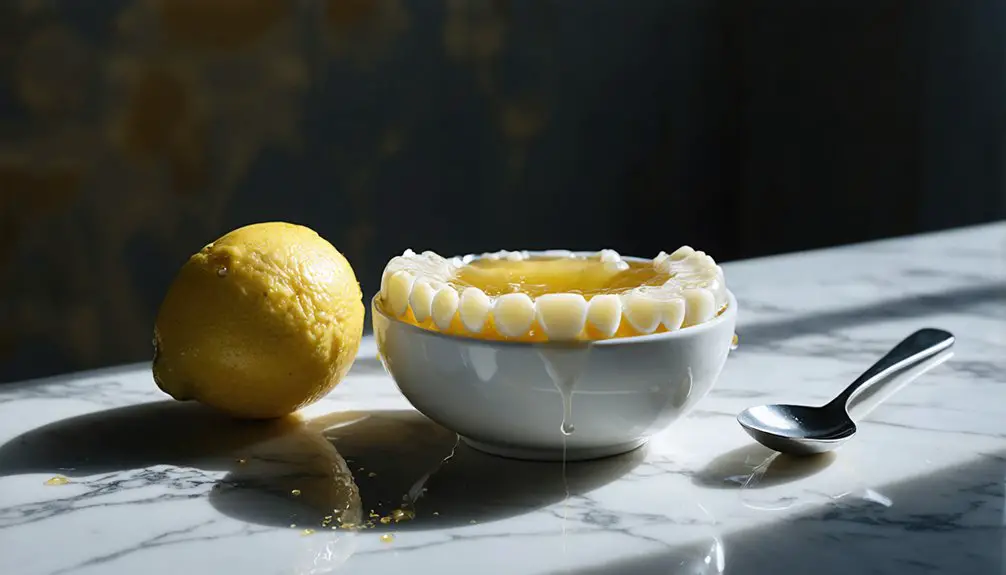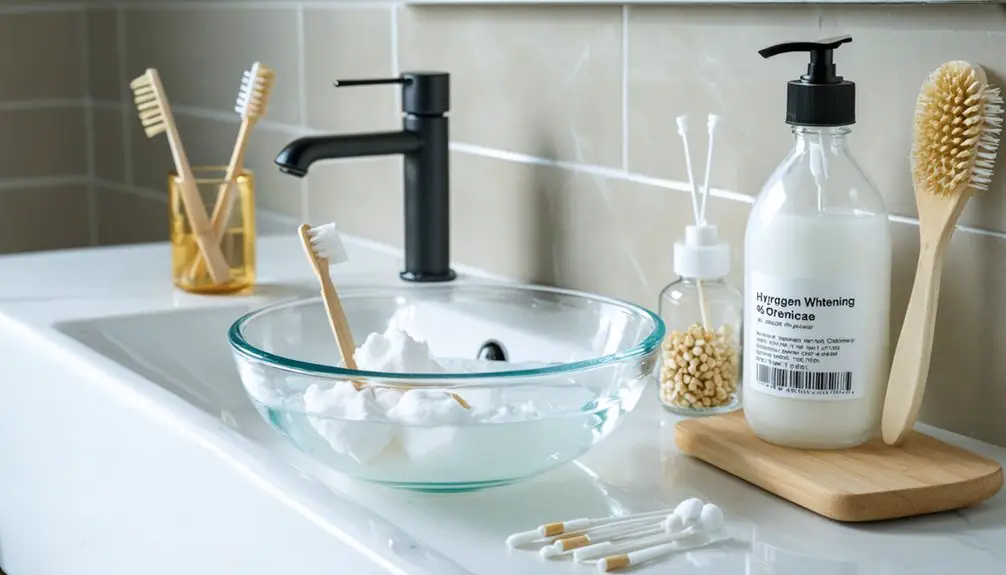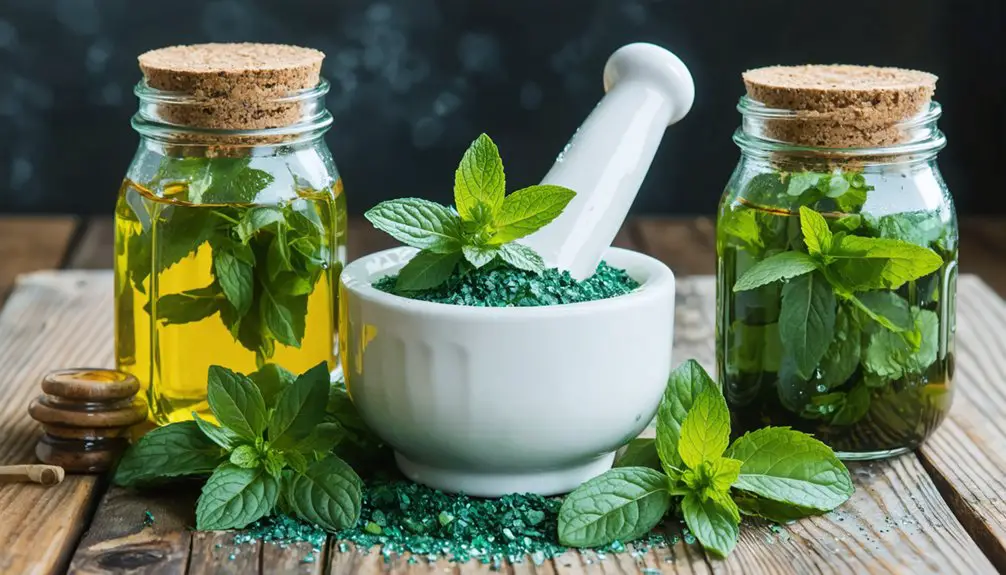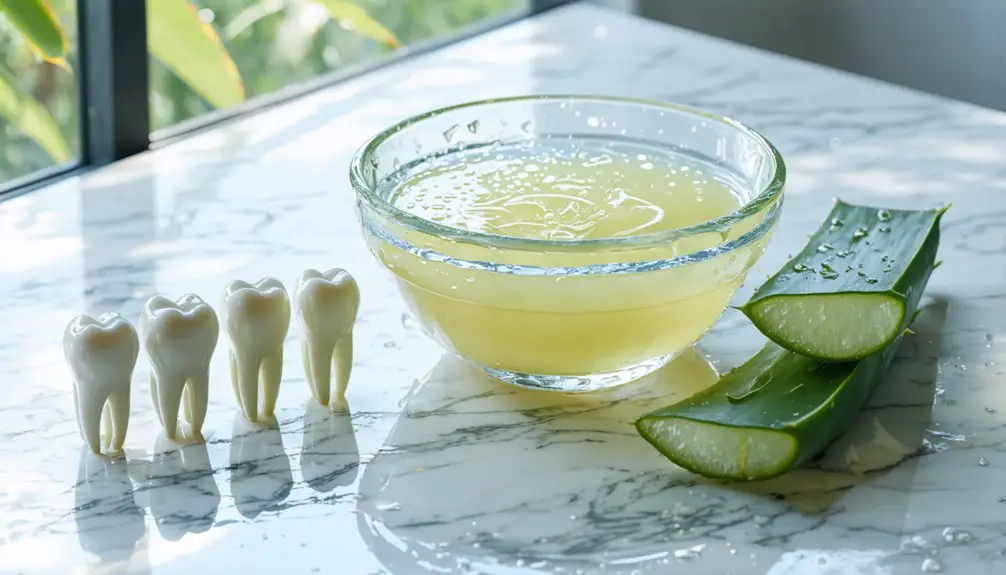While lemon juice offers natural whitening through its citric acids and antibacterial properties that fight tooth decay, you’ll need to use it cautiously to protect your enamel. You can achieve brighter teeth by diluting lemon juice with water in a 1:1 ratio and limiting applications to once or twice weekly. This cost-effective alternative to commercial products has shown promising results, with 76% of users reporting noticeable improvements. Discover how to safely incorporate this natural remedy into your dental routine.
Key Takeaways
- Lemon juice naturally whitens teeth through its acidic properties, creating a brighter appearance by etching the enamel surface.
- Antibacterial compounds in lemon juice fight Streptococcus mutans bacteria, reducing tooth decay and maintaining whiter teeth.
- Cost-effective alternative to expensive commercial whitening treatments, achieving comparable results with regular use.
- Simple application methods like diluted rinses or peel rubbing make it convenient for at-home teeth whitening.
- Contains vitamin C and citric acid that combat harmful bacteria while providing gentle stain removal effects.
Natural Whitening Properties of Lemon Juice
While lemon juice is often touted as a natural tooth whitener, its whitening effect primarily comes from its highly acidic nature.
With pH levels between 2 and 3, lemon juice’s citric and ascorbic acids create demineralization effects that dissolve the hydroxyapatite crystals in your tooth enamel, resulting in a frosted, whiter appearance. This acid exposure causes permanent enamel damage that cannot be reversed.
You’ll notice this whitening process is gradual, typically taking about four weeks to show visible results. Dental professionals recommend avoiding acidic fruits for tooth whitening due to potential harm.
The acids in lemon juice work by etching the enamel surface rather than through oxidation like commercial whiteners. This process creates microscopic porosity in your teeth’s surface, which contributes to their brighter appearance.
Unlike commercial whiteners, lemon juice etches tooth enamel through acid erosion, creating tiny pores that make teeth appear whiter.
The juice’s natural bleaching properties come from its combination of citric acid, vitamin C, and polyphenols, though it’s generally less effective than professional whitening products.
Antibacterial Effects on Oral Health
Despite its acidic nature, lemon juice offers significant antibacterial benefits for oral health through its natural compounds. The citric acid and vitamin C content work together to combat harmful bacteria while supporting your immune system’s natural defense mechanisms.
You’ll find these components particularly effective against Streptococcus mutans, a primary cause of dental caries. When diluted properly, lemon juice can help reduce bacterial colonization and fight bad breath by disrupting bacterial cell membranes.
Its antimicrobial properties also aid in preventing gum inflammation and supporting periodontal health. Using a straw while drinking lemon-containing beverages helps minimize direct contact with teeth surfaces. The high acidity can cause serious damage to tooth enamel over time. The antioxidants in lemon juice protect your oral tissues while the vitamin C promotes collagen production for healthier gums.
To maximize these benefits while protecting your enamel, always dilute lemon juice and rinse with water afterward. Consider using it as part of a thorough oral care routine.
Cost-Effective Alternative to Commercial Products
As dental whitening costs continue to rise, lemon juice presents an economical alternative to expensive commercial teeth-whitening products.
When comparing costs, you’ll find that lemon juice provides significant savings over specialized whitening kits, strips, and professional treatments, while delivering measurable whitening efficacy over time.
This budget-friendly option requires minimal equipment and no professional supervision, allowing you to manage your oral care expenses effectively.
The study found 76% of subjects rated the lemon-based toothpaste solution highly effective for whitening teeth.
Studies have shown that consistent lemon juice application can achieve noticeable tooth color changes within four weeks, rivaling some commercial products.
Research confirms that citric acid erodes tooth enamel permanently, making this a potentially damaging choice for dental health.
You’ll appreciate the accessibility and straightforward application process, though it’s essential to recognize that results appear gradually.
While the initial cost comparison heavily favors lemon juice, consider that prolonged use may require future dental care due to potential enamel sensitivity.
Quick and Easy Home Application Methods
When considering home teeth whitening with lemon juice, several application methods offer varying degrees of effectiveness and safety.
You can dilute lemon juice with water in a 1:1 ratio for a gentle rinse, which helps loosen surface stains while minimizing enamel damage. The juice’s high acid content naturally brightens tooth surfaces.
For spot treatment, you’ll find that rubbing the inside of a lemon peel directly on your teeth provides a milder approach with natural whitening properties. The citric acid in lemons helps eliminate bacteria that contribute to stain formation.
While some suggest mixing lemon juice with baking soda, this combination isn’t recommended due to its potential to harm your enamel.
After any application method, immediately rinse with water or fluoride mouthwash, and wait at least 30 minutes before brushing.
Remember to limit these treatments to once or twice weekly to protect your dental health.
Combining Lemon Juice With Other Natural Remedies
While combining lemon juice with other natural remedies might seem like an effective way to enhance teeth whitening results, scientific evidence suggests that many of these mixtures can damage your dental health.
When examining common lemon juice combinations, research shows that mixing with baking soda or activated charcoal can lead to harmful enamel erosion due to acid exposure and abrasion. The high acidity of lemon juice can cause significant tooth damage over time. Dental professionals warn that enamel never regrows once it’s worn away.
Though combining lemon with salt in controlled toothpaste formulations has shown promising results for stain removal, direct application of homemade mixtures remains risky.
For ideal dental safety, avoid DIY lemon-peroxide solutions, which can increase tooth sensitivity and weaken enamel.
Instead, protect your patients’ oral health by recommending professionally formulated whitening products that balance pH levels and ingredient concentrations.
Frequently Asked Questions
How Long Should I Wait After Using Lemon Juice Before Brushing My Teeth?
You’ll need to wait 30-60 minutes before brushing your teeth after using lemon juice, allowing your tooth enamel to re-harden naturally. This oral hygiene practice protects against harmful erosion.
Can Children Use Lemon Juice for Teeth Whitening?
With children’s enamel taking 2 years to fully calcify after teeth erupt, you shouldn’t use lemon juice due to serious safety concerns. Instead, consult your dentist for age-appropriate alternative methods for teeth whitening.
Will Lemon Juice Remove Deep Stains From Coffee or Smoking?
No, lemon juice won’t effectively remove deep coffee or smoking stains. Its limited stain removal effectiveness can actually damage your enamel, making teeth more vulnerable to future staining. Professional treatment is recommended.
Does Diluting Lemon Juice With Water Make It Safe for Teeth?
Purposefully prepared dilution ratios won’t protect your teeth. Even diluted lemon juice remains acidic enough to damage dental enamel. Safety concerns persist, so you shouldn’t use it for teeth whitening.
Can Existing Dental Work Be Damaged by Lemon Juice Treatments?
Yes, lemon juice can damage your dental work by weakening bonding materials and causing enamel erosion. You’ll risk dental sensitivity and may need repairs to crowns, fillings, or veneers from acid exposure.
References
- https://pmc.ncbi.nlm.nih.gov/articles/PMC10024105/
- https://betterbiom.com/blogs/learn/do-lemons-whiten-your-teeth
- https://www.healthline.com/health/baking-soda-and-lemon
- https://www.medicalnewstoday.com/articles/324653
- https://www.portpacificdental.com.au/5-common-myths-about-natural-teeth-whitening/
- https://jamdsr.com/uploadfiles/25vol10issue1pp109-114.20220128072249.pdf
- https://www.qualityfamilydentist.com/blogs/all-natural-teeth-whitening-what-works-and-what-doesnt
- https://alignerco.com/blogs/blog/thinking-about-natural-teeth-whitening
- https://dentally.in/what-does-lemon-do-to-teeth-the-effects-risks-and-benefits/
- https://nvdentalbraces.com/is-lemon-juice-bad-for-your-teeth/



